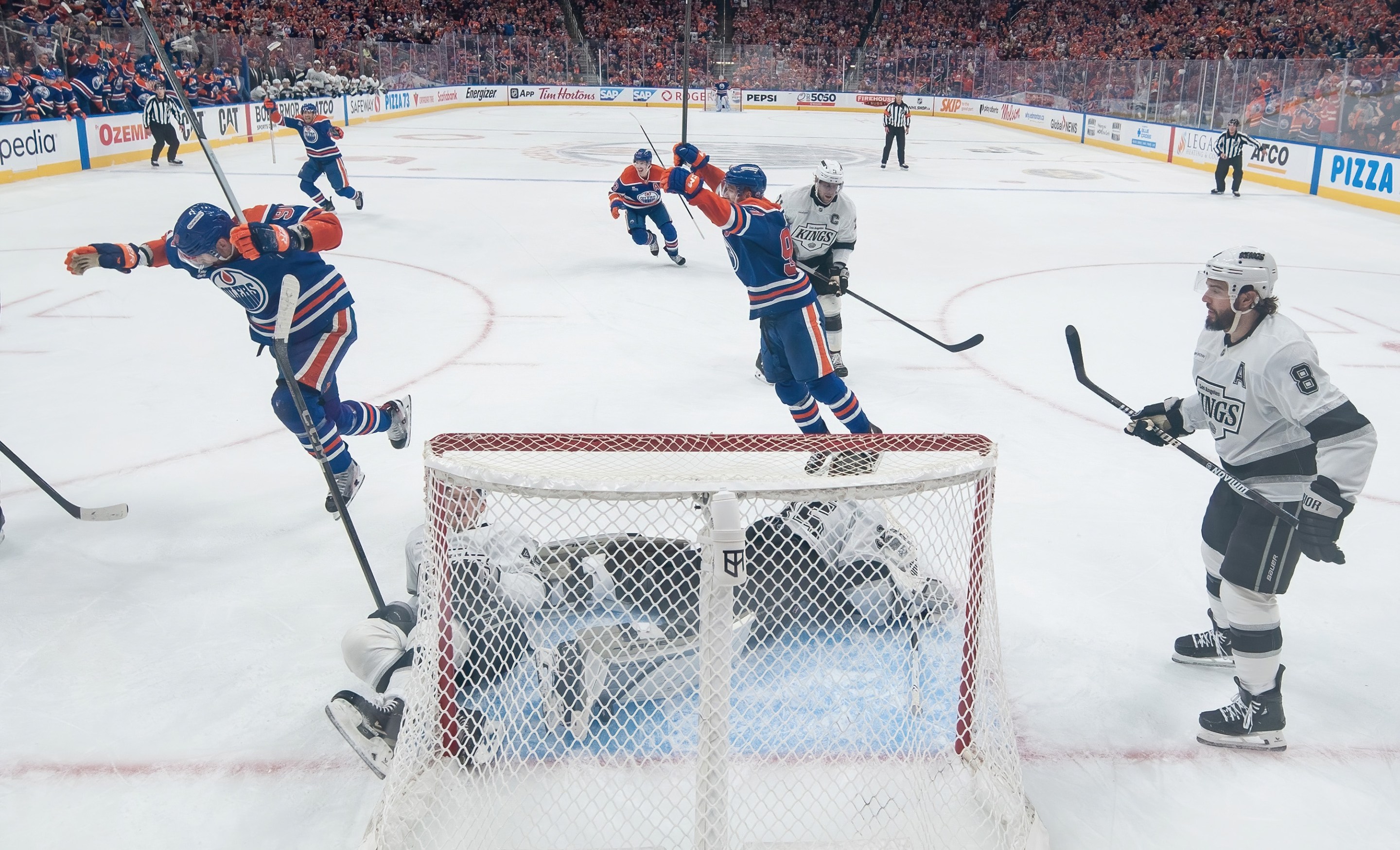Give the Kings and Oilers this: Their commitment to never making anything easy has led to some pretty great TV. The games in this first-round series have mostly followed the same basic outline. The Kings nab a multi-goal lead; the Oilers score a couple to get back in it. The moments where the game scripts have differed—why the series is tied 2-2 rather than already decided, in either team's favor—have all come in act 3, and have hinged on whether L.A. can close out what it started, or whether Edmonton has enough time left for its furious late-game rallies. Neither is a particularly envious position to be in. But all else being equal, I'd rather be the team that gets better as games wear on rather than the one that mostly seems to get tired.
The Oilers took Game 4 in Edmonton 4-3 in overtime Sunday night, by—what else?—a multi-goal, third-period comeback. It doesn't even get to the extra frame without Quinton Byfield failing to clear the puck and instead turning it over to Evan Bouchard with under a minute left. I'll chalk it up to being gassed—heavy legs and low oxygen levels make for bad decisions and worse execution—and Byfield, who's going to be a huge star if he's not there already, ended up playing a whopping 38 shifts in this one, most among forwards on either team. But fail to clear he did, and Bouchard scored his second unanswered of the period to tie things up.
Kings coach Jim Hiller is leaning on his horses, and they're suffering. Los Angeles is basically rolling three lines and two pairings, the lack of depth proving as much a liability as those depth players themselves might be. Every team shortens its rotations in the playoffs, but Hiller is taking it to an extreme. When you're functionally icing nine forwards and four defensemen, they wear down. "At the end, they had more energy, and obviously they came back,” Kings center Phillip Danault said. "Obviously it takes a lot of energy. We have to find a way to seal the deal."
The Oilers are doing the Kings no favors by playing an exhausting brand of hockey to defend, driving play and chucking pucks. In addition to their 48 shots on goal, Edmonton had an eye-popping 32 others blocked by L.A. skaters. Bouchard said he knew he had to get some elevation on his game-tying goal in order to avoid that black-and-white obstacle course. "This team is doing a good job getting into shooting lanes," he said. "When that puck came up, I knew I had to hit the net."
Hiller, who blew an awful coach's challenge in Game 3 that led to the Oilers' go-ahead goal, runs the risk of looking to be in over his head here with the way he's managing minutes. His skaters are visibly wilting as games wear on: The Kings outshot the Oilers 28-15 in the first two periods, before Edmonton dominated the third period and overtime 33-13. The OT period, especially, carried an air of inevitability, with the Oilers taking shot after shot and the Kings hanging on for dear life. Vladislav Gavrikov had already been out on the ice for two minutes when he tripped Connor McDavid to hand the Oilers a power play, which they would promptly capitalize on.
An increasingly knackered L.A. roster bodes ill when it's still just the first round, but of course the Oilers aren't helping themselves by falling into early holes. Leon Draisaitl, who scored the winner, kept tempering his praise of his team's comebacks with the caveat that it'd be even better not to need them. "It’s a mentality that we have, that we’re never going to quit, no matter what," Draisaitl said. "We’ve shown that in the series so far, maybe a little bit too much. ... [W]e can be really proud of that. But you don’t want to do that every night."
What we have as a result is an acutely entertaining series, with clear storylines and elite talent pushing each other to and past their limits. This is about as fun as the first round gets. And now it's a best-of-three; no time for the Kings, or viewers, to catch their breaths.






